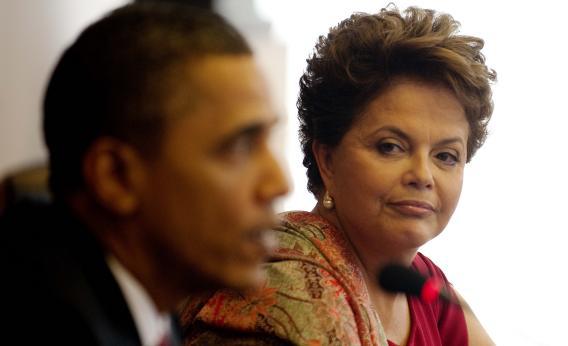Brazilian President Dilma Rousseff’s decision to cancel her state visit to Washington–the White House’s only State Visit planned for this year—is probably the most dramatic diplomatic ramification of Edward Snowden’s NSA leaks so far. But it’s also worth keeping an eye on what the fallout of the story will mean for the future of the Internet in Latin America’s largest country and largest IT market.
In light of the allegations of U.S. spying on the Brazilian government, reported by Brazil-based journalist Glenn Greenwald, the Brazilian government is now threatening to force Internet service companies like Google and Facebook to set up local data centers to protect users’ data from NSA spying. Most of the country’s global internet traffic currently passes through the United States, and the NSA story has prompted new discussion of building a fiber optic cable directly to Europe to give Brazil and other Latin American countries a network free of U.S. snooping.
Brazil still has something of a reputation as a defender of Internet freedom, which is fair by the standards of other large emerging economies, but also highlights the degree to which different countries differ on what that means.
According to Google, Brazil led the world last year in government requests for content removal with 640. (The United States was second.) Many of the requests involved alleged instances of defamation of public officials during the 2012 election. Google complied with only 21 of the requests. In 2006, Brazilian authorities threatened to close down Google’s operations in the country after demanding information on users of the company’s Orkut social network that prosecutors said was needed to crack down on child pornography. There have also been reported instances of Brazilian authorities leaning on ISPs to block access to criticism of soccer executives and online journalists being threatened with lawsuits or even violence for going after officials.
Last year, Brazil—along with Russia and China—was one of the countries at the International Telecommunications Union conference in Dubai pushing for national governments to be granted greater control over Internet governance The so-called “cyber-sovereignty” movement was opposed by the United States and other western democracies.
Again, Brazil still has a very free and open internet by global standards, but with Rousseff now calling for the U.N. to reopen the topic of global internet governance, the cyber-sovereignty movement could pick up steam again. As privacy expert Bruce Schneier tells the AP, Brazil’s moves could embolden, “some of the worst countries out there to seek more control over their citizens’ Internet. That’s Russia, China, Iran and Syria.”
As David Bosco notes, the United States and European countries were able to scuttle the drive for governments to be granted more control over internet governance last year partly on the grounds that it would inevitably lead to authoritarian countries stifling and monitoring online free expression. It becomes a lot harder for the U.S. government to stand on principle if it’s clear that the current internet governance arrangement makes it easier for the U.S. to spy on its allies.
It would be an unfortunate irony if one outcome of the NSA revelations was an internet with more control and monitoring by governments.
